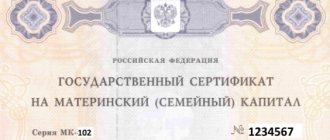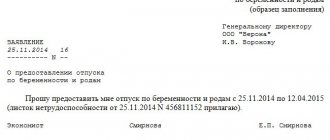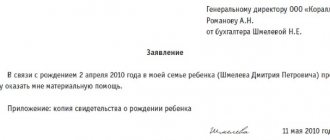Home / Family law / Benefits and benefits
Back
Published: 07/29/2018
Reading time: 23 min
0
439
At the birth of a second child, parents are entitled to a number of additional payments from the state. These include benefits for the birth of a second child, guaranteed at the federal and regional levels. In terms of frequency of payments, benefits are divided into one-time and monthly.
- One-time payments at the birth of a second child
- Amount of federal lump sum payments
- Amount of governor's and regional one-time benefits
- Monthly allowance
- Amount of monthly benefits
- How to apply
List of all payments due at the birth of the first child
On the occasion of pregnancy and the birth of the first child in the family, the following one-time and regular benefits are paid:
- Maternity leave (immediately during pregnancy, birth and the postpartum period).
- One-time:
- for early registration of a woman;
- the spouse of a serviceman who is in the army on conscription;
- when the baby is born.
- Every month:
- for caring for an infant under the age of one and a half years;
- additional payment for the first-born child (introduced in 2021);
- for the son (daughter) of a parent who is in military service by conscription;
- in case of loss of a breadwinner-military;
- for a child living within the Chernobyl site until he turns 3 years old;
- for a child from a low-income family until he reaches adulthood.
Who has the right to count on regional benefits?
Who is entitled to the governor's payment at the birth of a child? Parents or adoptive parents of a newborn child can count on regional one-time benefits if the corresponding legal regulation is in force in their territory of residence. Regional benefits for the birth of a child in 2021 are paid to all applicants without exception upon the birth of a child or are targeted (for example, only to low-income or large families).
The specific list of recipients must be clarified with the social security authorities at the place of residence, the local administration or regional legislation.
Termination of payment
Payment stops in the following cases:
- when the child reaches the age of three years - from the day following the day the child turns three years old;
- in the case of a citizen receiving the specified payment moving to a permanent place of residence in another subject of the Russian Federation - from the 1st day of the month following the month in which the executive authorities of the subject of the Russian Federation exercising powers in the field of social protection of the population, and (or ) the territorial bodies of the Pension Fund of the Russian Federation have been notified of the change of residence;
- in case of refusal to receive the specified payment - from the 1st day of the month following the month in which the executive body of the constituent entity of the Russian Federation exercising powers in the field of social protection of the population and (or) the territorial body of the Pension Fund of the Russian Federation who appointed the payment received relevant statement;
- in the event of the death of a child, with the birth (adoption) of which the citizen has the right to receive the specified payment - from the 1st day of the month following the month in which the child’s death occurred;
- in the event of the death of a citizen receiving the specified payment, declaring him dead in the manner established by the legislation of the Russian Federation or recognizing him as missing, as well as in the event of depriving a citizen receiving the specified payment of parental rights - from the 1st day of the month following the month, in in which the death of this citizen has occurred or a court decision has entered into legal force to declare him dead, or to recognize him as missing, or to deprive him of parental rights;
- in the case of using maternal (family) capital in full.
Payments can be resumed if:
- cancellation of a court decision to declare a citizen receiving the specified payment dead, or to recognize him as missing, or to deprive him of parental rights - from the 1st day of the month following the month in which the court decision entered into legal force;
- filing an application for the renewal of the specified payment by a citizen who refused to receive it - from the 1st day of the month following the month in which the executive body of the constituent entity of the Russian Federation exercising powers in the field of social protection of the population is responsible for assigning the specified payment, and (or ) the territorial body of the Pension Fund of the Russian Federation received a corresponding application.
One-time benefits
The Russian system of assistance for the birth of first children provides several types of one-time subsidies. They are stimulating and compensatory in nature. To receive them, parents do not need to obtain a certificate or other special document.
Benefits for women registered for pregnancy up to 12 weeks
It is a stimulating measure. The right to use it is granted by law - Article 9 of Federal Law No. 81 of 1995.
What does the expectant mother get for this in 2021? The amount of the additional payment is 628.47 rubles.
Full-time students are paid cash as a scholarship.
The one-time allowance provides:
- employer (together with the insurance amount);
- educational institution (student);
- social protection authority for the population (unemployed).
Maternity benefit
They pay to women in the workplace or official place, i.e., those who are compulsorily insured.
Unemployed pregnant women cannot apply for it, except in the case of official recognition as unemployed for a year from the date of dismissal as a result of the closure of the enterprise.
The payment is made for the entire duration of maternity leave (usually 140 days, 156 or 194 days (in special situations)) as compensation for the inability to work and have an income before and after childbirth. The benefit is calculated based on the number of days actually spent on vacation.
The payment amount is the full average monthly salary, calculated for the last two years before going on maternity leave. The average daily salary for this period is determined by dividing the entire amount of funds received for 2 years by 730 or 731 days.
Please note: if a pregnant woman worked in two places during the last two-year period, she has the right to contact each employer for payment.
One-time benefit for the birth of a child
This payment can only be received once.
The amount of funds is not tied to the place where the woman in labor lives and is fixed.
From February 2021, it is equal to 16,759.08 rubles.
According to Art. 11 Federal Law No. 81, the amount of the subsidy is established on the day the baby is born.
So, if the son’s date of birth was in January 2021, then the maternity payments are equal to 16,350.33 rubles.
One-time benefit to the wife of a military man
Paid when the child is gestated for 180 days or more. Documentary confirmation of the woman's status is mandatory.
The amount of the payment is determined and legislated annually by the federal authorities.
In 2021, 26,721.01 rubles are due.
If a region has a regional wage coefficient, the amount increases in accordance with it.
Please note: spouses of cadets at military educational institutions do not receive such subsidies.
Benefits for low-income families
A family is recognized as low-income (poor) when the level of income for each person is less than the minimum subsistence level in the region (less than 13,747 rubles for Moscow).
The first thing to do is to assign such a status. To do this you will need:
- Provide to the multifunctional center at the place of registration identification documents of all family members (passport, birth certificates of all children), a divorce or marriage certificate, certificates of all available official income.
- Write an application to recognize the family as low-income.
- Wait for a decision to be made.
If an employee of the social protection department makes a decision in favor of the applicant, then the family is recognized as low-income and may qualify for benefits for the poor.
Sample application
.
A family whose income per person is less than the minimum wage has the right to apply for the following benefits from the social protection department:
Monthly allowance for child care up to 3 years old
| Payment for 2021 (RUB) | Payment for 2021 (RUB) | |
| For single mothers or single fathers | from 2400 to 5000 | 15000 |
| For military personnel, including conscripts | from 2400 to 5000 | 15000 |
| For complete families | from 2000 to 3000 | 10000 |
Monthly allowance for child care up to 18 years of age
| Payment for 2021 (RUB) | Payment for 2021 (RUB) | |
| For single mothers or single fathers | from 2400 to 3000 | 6000 |
| For military personnel, including conscripts | from 2400 to 3000 | 6000 |
| For complete families | 2000 | 4000 |
Since 02/01/2018, the amount of benefits for Muscovites has more than doubled.
Other benefits
In addition to financial assistance, low-income families can receive a number of benefits:
- Payment for kindergarten and utilities in the amount of 50 percent of the total cost.
- Budget medicine until the child reaches six years of age.
- Preferential travel on public transport (except minibuses).
- Possible purchase of school clothes and teaching aids on a budget basis.
- A family may be in line to improve their living conditions or purchase a plot of land.
Luzhkov payments: recipients and amounts
What are Luzhkov payments at the birth of a child? In everyday life, Luzhkov payments are called payments made under the Moscow City Law “On Youth” dated September 30, 2009 No. 39. The document was signed by Yu. M. Luzhkov, the mayor of the capital during the period of development and the beginning of application of this law.
Not all categories of citizens can count on social support under Law No. 39. In paragraph 2 of Art. 23 provides that an additional lump sum payment in connection with the birth of a child is provided only to young families with permanent registration in Moscow.
The term “young family” also requires a separate explanation - the age of the spouses should not exceed 30 years (Clause 3, Article 1 of Law No. 39).
The source of payments is the Moscow city budget.
The benefit amount is determined based on two main parameters:
- the size of the Moscow subsistence minimum, established per capita of the metropolitan metropolitan population (for calculation, the subsistence minimum is taken on the date of birth of the child);
- what is the number of children in the family?
Luzhkov payments for the birth of a child in 2021 are:
Another indispensable condition that must be observed, otherwise young parents lose the right to benefits: at the birth of a second child and subsequent children, the previously born child (including the child of one of the parents) must be raised and supported by the relevant young family.
You must apply for benefits to the social security authorities no later than one year from the date of birth of the child.
Young Moscow families continue to receive the Luzhkov benefit for the birth of a child in 2021. Despite the fact that the mayor in the capital has long since changed, social protection measures for parents with children continue to apply.
Which documents
The social security/MFC specialist accepting the application will tell you exactly what documents are needed to apply for gubernatorial benefits. But in order not to waste time on unnecessary visits to institutions, you should know what is included in the basic package.
- Application for payment. Now such an application is filled out by the specialist himself. He will only need individual information from the parent and his signature;
- A copy of the birth certificate (or adoption certificate) for the second and first baby;
- A copy of the parents' marriage certificate;
- A copy of certificate form No. 25 from the registry office (for a single mother);
- Certificate of family composition or certificate of registration of parents and children;
- A certificate from social security stating that the other parent did not receive gubernatorial benefits for the birth of a second child;
- Parents’ passports, they are only presented, and copies remain with the specialist;
- Copy of the applicant's SNILS.
In some cases, additional documents will be required:
- 2NDFL certificate, which can be obtained from the employer or the tax service. Through the Federal Tax Service website, a 2NDFL certificate is provided for all income received. True, information about income for the past year is formed only in the middle of the current year. You also need to be registered in your personal account on the Federal Tax Service website and the certificate is valid only in electronic form (on a flash drive or when sent via the Internet). In any case, the citizen can choose what is more convenient for him in the employer’s accounting department or on the Federal Tax Service website;
- a copy of the work book or an extract from it;
- a certificate from the bank about the balance of the loan, a copy of the loan agreement and a payment schedule;
- And so on.
In certain social security departments and MFCs, the provision of some documents is not required, since specialists can obtain the necessary information independently from their databases.











